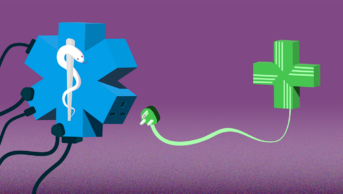
Shutterstock.com
Clinical pharmacists working in hospital care have found a regional patient care record “significantly beneficial”, a report published by the Newcastle University Business School has found.
The report on the Great North Care Record (GNCR), which covers the north east of England and North Cumbria, revealed that secondary care pharmacists working on medicines reconciliation benefited from the GNCR because it provides access to drug history in instances where patients may not recall their medications.
“In healthcare settings, most professionals save between five to ten minutes per patient, though pharmacists and emergency clinicians report larger time savings when accessing medication histories,” the report said.
The GNCR, launched in 2020, has become one of the most frequently used shared care records in England and gives healthcare professionals access to the patient records of 3.2 million people living in the north east of England and North Cumbria.
As of January 2025, the GNCR was being viewed over 1 million times per month, the report said. During this time, it contributed to “an estimated total saving of £38m across the region”.
The impact report also revealed that healthcare professionals in the region saved an average of 77 minutes per day and up to £1.5m each month in time-efficiencies by using the digital shared care record system.
Pharmacists access GP records to look for medications, allergies and sensitivities, GP encounters, notes, diagnoses, dates and community nursing information. This information provides essential background context which “can reveal useful information that might not be obvious”, the report added.
For specialty frailty pharmacists, the GNCR allows for a quick review of medications, aimed to reduce the risk of patients returning to hospital.
It is aimed to save pharmacists a significant amount of time, because they are able to access test results, such as blood tests, instead of contacting GPs for that information.
The report also said the system speeds up consultation, provides a better “texture” of information and improves the quality of decision-making.
Since 2021, NHS England’s policy has required every integrated care system (ICS) to implement a shared care record. By March 2025, all 42 ICSs had an operational system covering their area.
Commenting on the report, Darren Powell, chair of the Royal Pharmaceutical Society’s Digital Pharmacy Expert Advisory Group, said: “For hospital pharmacists, having timely access to accurate medication histories is essential for safe and effective care.
“This report reinforces what RPS has long called for — when pharmacists can view a patient’s complete medication history, they are better able to reconcile medicines, prevent errors and make informed clinical decisions.
“This demonstrates the impact that shared care records can have on improving patient safety and clinical outcomes. As pharmacists take on greater prescribing responsibilities, particularly with all newly qualified pharmacists becoming prescribers in 2026, access to shared care records will be critical.”
Lisa Sewell, programme director of the GNCR, said: “These results and savings are the testament of what cross-sector collaboration and innovation can achieve.
“We hope having this information available ensures that the GNCR is continued to be used as a tool to benefit communities across the north east [of England] and North Cumbria.”


